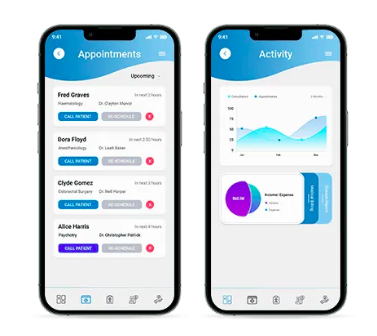The healthcare industry is undergoing a significant transformation, driven by advancements in mobile technology. Mobile applications are playing a pivotal role in enhancing patient care, streamlining administrative processes, and improving overall healthcare delivery. Developing effective medical app developers requires expertise in both healthcare practices and mobile technology.
The Role of Healthcare Mobile Applications
Healthcare mobile applications serve as a bridge between patients and healthcare providers, offering a range of functionalities that enhance the healthcare experience. Key roles include:
- Patient Engagement: Apps facilitate direct communication between patients and healthcare providers, enabling appointment scheduling, medication reminders, and access to medical records.
- Remote Monitoring: Mobile applications allow healthcare providers to monitor patients' health remotely, ensuring continuous care and timely interventions.
- Data Management: Apps assist in managing and storing patient data securely, ensuring compliance with healthcare regulations and facilitating easy access to medical histories.
- Telemedicine: Mobile applications enable virtual consultations, reducing the need for in-person visits and expanding access to healthcare services.
Benefits of Healthcare Mobile Applications
The integration of mobile applications in healthcare offers numerous benefits:
- Improved Patient Outcomes: By providing tools for self-management and continuous monitoring, mobile apps empower patients to take control of their health, leading to better outcomes.
- Enhanced Efficiency: Automating administrative tasks such as appointment scheduling and billing reduces the workload on healthcare staff, allowing them to focus more on patient care.
- Cost Savings: Telemedicine features reduce the need for physical infrastructure and in-person visits, leading to cost savings for both healthcare providers and patients.
- Increased Accessibility: Mobile applications make healthcare services more accessible, especially for individuals in remote areas or those with mobility challenges.
Key Features of Effective Healthcare Mobile Applications
Successful healthcare mobile applications typically incorporate the following features:
- User-Friendly Interface: An intuitive design ensures that users, regardless of their technological proficiency, can navigate the app with ease.
- Secure Data Handling: Robust encryption and compliance with healthcare regulations such as HIPAA ensure the privacy and security of patient data.
- Integration Capabilities: The ability to integrate with existing healthcare systems, such as Electronic Health Records (EHR), facilitates seamless data exchange.
- Real-Time Notifications: Push notifications for appointment reminders, medication schedules, and health alerts keep patients informed and engaged.
- Multilingual Support: Offering multiple language options ensures that the app is accessible to a diverse patient population.
Challenges in Healthcare Mobile Application Development
Despite the advantages, developing healthcare mobile applications presents several challenges:
- Regulatory Compliance: Ensuring that the app complies with healthcare regulations and standards is crucial to avoid legal issues.
- Data Security: Protecting sensitive patient information from breaches requires implementing advanced security measures.
- Integration with Existing Systems: Integrating the app with existing healthcare systems can be complex and requires careful planning.
- User Adoption: Encouraging patients and healthcare providers to adopt and consistently use the app can be challenging.
The Future of Healthcare Mobile Applications
The future of healthcare mobile applications looks promising, with ongoing advancements in technology:
- Artificial Intelligence (AI): AI can enhance diagnostic accuracy, predict patient outcomes, and personalize treatment plans.
- Internet of Medical Things (IoMT): IoMT devices can provide real-time health data, enabling proactive care.
- Blockchain Technology: Blockchain can offer secure and transparent data management solutions.
- Augmented Reality (AR): AR can assist in medical training and patient education.
As technology continues to evolve, healthcare software developer will play an increasingly vital role in delivering efficient, accessible, and personalized care.
Conclusion
Healthcare mobile applications are transforming the healthcare landscape by improving patient engagement, enhancing efficiency, and expanding access to care. While challenges exist, the benefits of integrating mobile technology into healthcare are undeniable. By focusing on user-friendly design, secure data handling, and compliance with regulations, developers can create effective healthcare mobile applications that meet the needs of both patients and providers.






Comments